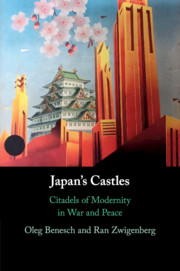'An exciting history of Japan from the Tokugawa period to the present, as seen through the lens of its castles. The book explores their shifting meaning within the context of Japan’s drive to modernize, its militarism, construction of empire, wartime devastation, postwar recovery, and search for meaning in a postmodern world.'
Constantine N. Vaporis - University of Maryland, Baltimore County
'In describing the life of Japanese castles, Benesch and Zwigenberg have taken an inherently interesting topic left unexplored by academics and given us a model of how to launch a new field of study with grace and aplomb. There is much here to satisfy students, scholars, and the interested public.'
Michael Wert - Marquette University, Wisconsin
‘Oleg Benesch and Ran Zwigenberg’s Japan’s Castles is a timely addition to the growing body of literature on historical memory and heritage in modern Japan … this groundbreaking work will change the ways readers will look at castles during future visits … this is a pioneering work that persuasively demonstrates the strengths of memory studies based on a methodological combination of field studies, archival research, and the analysis of a broad range of newspapers and periodicals. The increasing accessibility of such sources allows the contemporary historian to present a much more nuanced analysis than was possible in the past, and Benesch and Zwigenberg deserve the highest praise for having achieved this goal and for weaving the abundant information gathered together to produce a coherent, richly documented, and extremely stimulating volume.’
Sven Saaler
Source: The Journal of Asian Studies
‘In this well-researched book, Benesch (Univ. of York) and Zwigenberg (Pennsylvania State Univ.) offer an in-depth historical look into the vicissitudes of Japanese castles in modern times … this is a satisfying read!’
Q. E. Wang
Source: Choice
‘For the general reader, this is a book written, despite its clear academic rigor, in an eminently accessible style that will greatly enhance a historical or touristic interest in Japan’s castles. For the academic reader, it is full of valuable arguments and information pertinent not only to the niche field of castle studies, but to many areas of Japanese studies and/or modern history. The authors have done a particularly good job of demonstrating the relevance of castles to many of the mainstream issues in post-1850s Japan, making their book highly recommended for inclusion on any undergraduate or postgraduate reading list relating to modern Japanese history. Indeed, Japan’s Castles indicates the strong potential of castle studies to form an integral part of our understanding of the social, cultural, economic, and political development of modern Japan.’
Philip Seaton
Source: Monumenta Nipponica
‘Benesch and Zwigenberg draw on an impressive array of sources, ranging from official documents to local periodicals. The authors also include several fascinating visual sources that will help readers understand some of the more unorthodox trends in modern castle architecture; and many of the images are simply delightful in their own right. Overall, this is a sophisticated but accessible treatment of the eponymous subject, and is thus essential reading for specialists in modern Japanese history. Scholars interested in the intersections between urban history, politics and architectural preservation will also find much of interest. Benesch and Zwigenberg have made an invaluable contribution to the field, which will undoubtedly inspire some exciting scholarship in the coming years.’
D. Colin Jaundrill
Source: The English Historical Review
‘Benesch and Zwigenberg argue that from the start of the Meiji period to present time, castles of various extraction- whether original to the Sengoku period, restored, reconstructed, or newly invented - have continuously occupied a central place in the politics, militarization, economy, religion, and cultural identity of cities across the main islands of Japan. As physical structures and symbolic features, castles carry the baggage of premodern heritage while also igniting new aspirations for national unity and regional revitalization. The book steers us toward the realization that the majority of castles standing today reveal much less about Japanese bushido, traditional architecture, and esprit de corps than we would like to believe.’
Alice Y. Tseng
Source: The Journal of Japanese Studies
‘With Japan’s Castles, Oleg Benesch and Ran Zwigenberg have provided a uniquely valuable addition to English language scholarship on their subject, one that has much to offer to anyone with an interest in Japan studies and cultural heritage. This volume, within the context of the authors’ wider work on the subject, will remain the definitive work on the heritage politics of castles in modern Japan. The authors ably explore how castles have been used to present the country’s feudal past and put to practical use in both the militarised imperial state and the demilitarised postwar period, thus presenting Japan’s castles as a mirror for its changing self-conception as a modern nation state … This work is certainly a necessary addition to any library on modern Japan, and I recommend it unreservedly.’
Jon Morris
Source: Social Science Japan Journal





